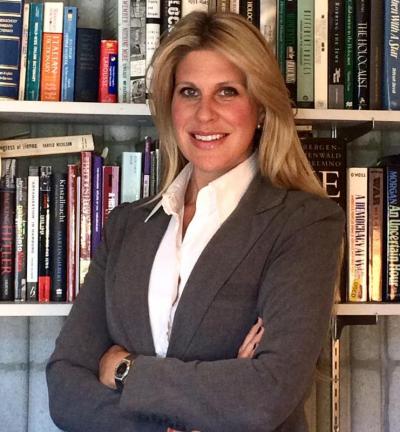University professor discusses her upcoming book on Nazi Vienna
Following a 20-year journey, University of Massachusetts Dartmouth history professor Ilana Fritz Offenberger has completed her first book.
"The Jews of Nazi Vienna, 1938-1945" follows Austrian Jewish families, and how the deportation and confinement of a whole people impacted their communities. Dartmouth Week sat down with Offenberger to discuss the recent publication.
Having Austrian Jewish ancestry, how was your research influenced by your background?
I am Jewish, but I don't practice. It's more cultural. But my grandparents fled to this country from Vienna right before World War II. They were forced to leave because of their religion and quote-unquote, "race."
My grandfather, he was put in a concentration camp — Dachau — and he was released. Now I know from my research that this happened to many men, but growing up, I didn't understand how he was released from a concentration camp [after being incarcerated for nine months]. In a nutshell, he was very lucky.
That was one of the questions I ended up researching. It always made me very curious why he was kicked out of his home and what was his story. If he wasn't released, I wouldn't be here.
[Additionally] I'm named after him. This awkward, male, German name — Fritz. I found out that there was a lot in this name that I was connected to.
Where did your research begin and what was that process like?
Research for the book started in 1998. That's when my journey began.
My grandmother was a big influence in this book. We were supposed to go to Austria together, but she passed away. I spent my junior year [of college] abroad in Austria.
[Offenberger studied at Skidmore College in New York before spending her junior year at Salzburg College in Austria. She received her bachelor's in German Studies from Skidmore, and received her Ph.D in history at Clark University in Worcester.]
I visited the concentration camps, and I started piecing together my family history. Then, I had to start learning German because I couldn't read any of the [archived] documents. It was an organically developing process. I knocked on different doors and they just kind of opened.
During your research, what were some major finds that stuck with you?
I found the grave of my great-grandparents, so it was kind of interesting to be on the other side of the world, to make that connection, to see the grave with my name on it. The Jewish cemetery is overgrown, so I couldn't find the grave the first time. I found it eventually.
[In the Austrian state archives, through the finance ministry] I saw the transfer of all [my grandfather's] assets to the Nazis. It was the legalized robbery of all of his assets because he was Jewish. All the documents have swastikas and "Heil Hitler." That was my big kind of moment.
That also allowed me to see all the addresses, the properties that were owned by my family. It allowed me to walk around the city and see this was our house, this was our store. It really started to come alive.
Tell me about how the book is written.
It's written chronologically. It's all historically accurate, and written using primary sources [such as letters, memoirs, documents].
The story follows families. It's not about one person. It's about communities. It follows them from when the Nazis took over to the end of the war. Some families commit family suicide; that's how extreme it is. Other families try to get on a train and get out. Other families don't do anything; they follow orders and wait for this thing to go away.
My family was the inspiration, but my family is hardly even in this story. I wrote the story about the community in which [my grandfather] lived. I wanted to know what their experience was.
Why should readers pick up your book?
The voices of the of the people who lived through this time, they speak in the book. They tell their story in their voices through primary sources. You get this inside account of how people survived, how they tried to cope, how they tried to flee.
Some of these families managed to survive. Some of them... these are their last words. People need to know that these people existed. Their story shouldn't be forgotten just because they didn't make it. We shouldn't allow their story to be forgotten.
What they went through can help us empathize more in the current day with people's struggles, and make us more aware and helpful.
How has your journey into the past impacted your life today?
The research and the love for doing research, learning how to be diligent, learning to be patient, learning how to keep pushing to try to find answers, and now being able to share this with my students is one of the most fantastic things ever.
I like passing along my journey. If you follow your passion, it can organically develop into something great. It allowed me to share my message: We need to stand up for people who are less fortunate and be aware of racism and intolerance. This book is a story of what happens when people don't [do that].
This book took you seven years to write. What's next?
It feels like the greatest accomplishment of my life. I always knew that I was going to publish this because it's material that needs to be exposed.
My next project will investigate the Czech Jewish culture.
Offenberger will speak at the Tiverton Library on July 24 at 6:30 p.m. She will speak at Bristol Community College and UMass Dartmouth in September.













